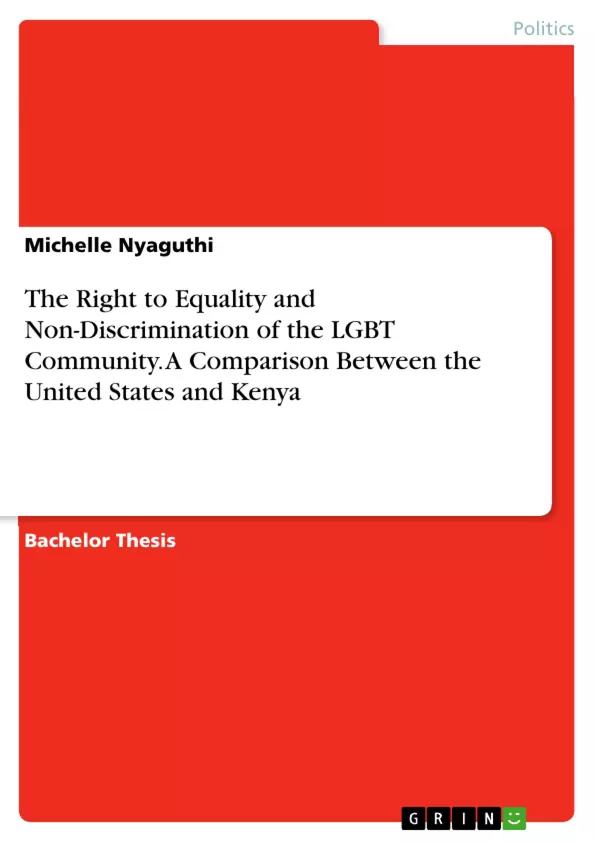This paper shall seek to discuss if the LGBT community has rights that are equal to those of heterosexual beings. It shall also extensively discuss the right to equality and freedom from discrimination of Lesbians, Gay, Bisexual and Transgender.
Consequently, this paper shall focus in depth on the religious, political, social, cultural views in the United States, Kenya and other various countries around the globe.
In addition, this study shall seek to discuss the international and regional framework of LGBT rights in the United States, Kenya and other countries around the world.
Moreover, this study shall analyze the role of the courts both in the United States and Kenya. It shall seek to discuss why such rights are discriminatory and if Kenya should adopt the position as other countries that have passed the laws governing the LGBT community and to ensure the protection of the LGBT community.
This research paper shall be based on desk study. The study will look into the International Bill of Rights, the Supreme Law of Kenya, The constitution of Kenya 2010 and other relevant legislative enactments, case law, historical studies, newspaper articles and also at interviews carried out by other researchers.
Inhaltsverzeichnis (Table of Contents)
- CHAPTER ONE
- INTRODUCTION TO THE STUDY.
- BACKGROUND.
- EGAL PROTECTION OF LGBT RIGHTS
- VIOLENCE AND DISCRIMINATION AGAINST LGBT COMMUNITY.
- RATIONALE OF THE STUDY.
- THEORETICAL AND CONCEPTUAL FRAMEWORK
- CONCLUSION.
- ORGANIZATION OF THE STUDY
- CHAPTER TWO
- RELIGIOUS, POLITICAL, CULTURAL VIEWS AND INTERNATIONAL AND REGIONAL FRAMEWORK ON THE LGBT RIGHTS
- INTRODUCTION..
- RELIGIOUS, POLITICAL, CULTURAL VIEWS ..
- INTERNATIONAL FRAMEWORK
- UNITED NATIONS INTERNATIONAL BILL OF RIGHTS..
- OTHER TREATIES AND CONVENTIONS..
- REGIONAL FRAMEWORK
- LEGAL PROTECTION ON LGBT RIGHTS
- CONCLUSION.
- CHAPTER THREE
- COMPARATIVE STUDY ON THE POSITION OF THE LGBT IN THE UNITED STATES AND KENYA
- INTRODUCTION.
- ROLE OF THE COURTS TO DECRIMINALISE HOMOSEXUALITY IN THE UNITED STATES
- ROLE OF THE COURTS DECRIMINALIZING HOMOSEXUALITY IN KENYA.
- LIMITATION OF RIGHTS.
- POTENTIAL OF DECRIMINALIZATION UNDER THE CONSTITUTION..
- CONCLUSION.
Zielsetzung und Themenschwerpunkte (Objectives and Key Themes)
This research project aims to examine the right to equality and non-discrimination of the LGBT community, focusing on a comparative study between the United States and Kenya. It explores the legal, social, and cultural contexts surrounding LGBT rights in these two nations.
- Legal Frameworks for LGBT Rights in the US and Kenya
- The Impact of Religious, Political, and Cultural Views on LGBT Rights
- The Role of Courts in Decriminalizing Homosexuality
- The Challenges and Opportunities for LGBT Equality in Both Countries
- The Potential for Constitutional Recognition of LGBT Rights
Zusammenfassung der Kapitel (Chapter Summaries)
Chapter One introduces the study, providing background information on the legal protection of LGBT rights, the prevalence of violence and discrimination against the LGBT community, and the rationale for conducting this research. It also outlines the theoretical and conceptual framework used throughout the project. Chapter Two examines the religious, political, and cultural views that shape attitudes towards LGBT rights. It also explores the relevant international and regional frameworks, including the United Nations International Bill of Rights, other treaties and conventions, and the African Commission on Human and Peoples' Rights. Finally, Chapter Three presents a comparative study of the legal position of the LGBT community in the United States and Kenya. It analyzes the role of courts in decriminalizing homosexuality, identifies limitations to LGBT rights, and examines the potential for constitutional recognition of LGBT rights in both countries.
Schlüsselwörter (Keywords)
The key terms and concepts explored in this research project include LGBT rights, equality, non-discrimination, legal frameworks, constitutional rights, decriminalization of homosexuality, religious views, political views, cultural views, international human rights law, regional human rights law, comparative study, United States, and Kenya.
Frequently Asked Questions
What is the focus of the comparative study on LGBT rights?
The study examines the right to equality and non-discrimination for the LGBT community, specifically comparing the legal and social situations in the United States and Kenya.
How do cultural and religious views affect LGBT rights in Kenya?
Religious and cultural traditions often lead to significant discrimination and violence against the LGBT community, influencing both legislation and social acceptance.
What role do courts play in decriminalizing homosexuality?
The paper analyzes how courts in the US have successfully decriminalized homosexuality and discusses the potential for Kenyan courts to adopt similar constitutional protections.
Which international frameworks protect LGBT individuals?
The research looks into the International Bill of Rights and other UN treaties that establish universal standards for equality and freedom from discrimination.
Does the Kenyan Constitution of 2010 offer protection for LGBT people?
The study investigates the potential for decriminalization under the 2010 Constitution, balancing existing laws with the fundamental right to non-discrimination.
- Citar trabajo
- Michelle Nyaguthi (Autor), 2017, The Right to Equality and Non-Discrimination of the LGBT Community. A Comparison Between the United States and Kenya, Múnich, GRIN Verlag, https://www.grin.com/document/412501



